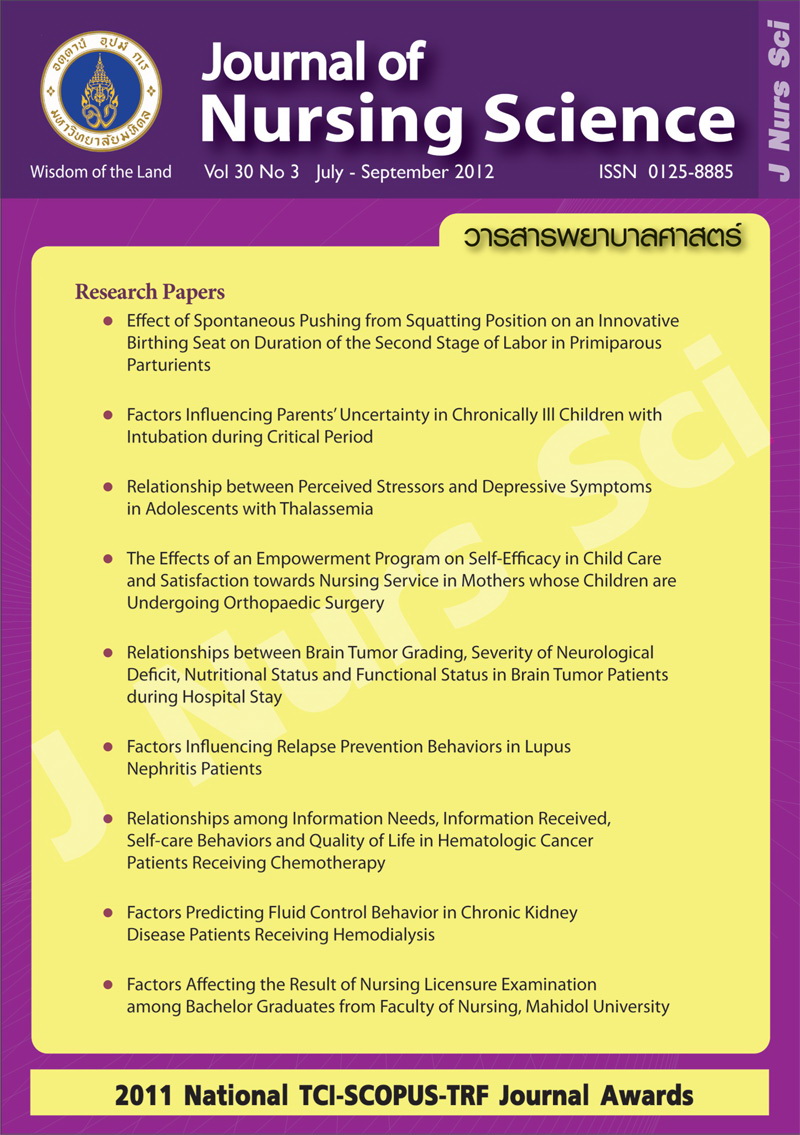Relationships between Brain Tumor Grading, Severity of Neurological Deficit, Nutritional Status and Functional Status in Brain Tumor Patients during Hospital Stay
Main Article Content
Abstract
Purpose: To examine the relationships between brain tumor grading, severity of neurological deficit, nutritional status and functional status in brain tumor patients during hospital stay.
Design: Correlational study design.
Methods: The sample included 90 primary brain tumor patients who had a level of conscious of 13-15. All patients were admitted into either Siriraj Hospital or Prasat Neurological Institute. Data were collected through a recording form about personal information and previous illnesses and treatments received, the National Institute of Health Stroke Scale-Thai version, the Bhumibol Adulyadej Hospital Nutrition Triage, and the Modified Barthel Activities of Daily Living Index. Data were analyzed using
descriptive statistics and the Spearman rank-order correlation coefficient.
Main findings: Finding revealed that 86.6 % of the sample had a low grade brain tumor. The functional status of the sample was in fairly good level (X = 14.09, SD = 6.84). The results revealed that brain tumor grading was not significantly associated with functional status, but the severity of neurological deficit and nutritional status were significantly negatively associated with functional status (rs = - .41 and rs = - .34, p < .01, respectively).
Conclusion and recommendations: Nurses should develop clinical nursing practice guidelines for physical rehabilitation in order to decrease the severity of neurological deficits, improve nutritional status in patients during hospital stay which, in turn, will help improve functional status.
บทคัดย่อ
วัตถุประสงค์: เพื่อศึกษาความสัมพันธ์ระหว่างประเภทของเนื้องอกสมอง ความรุนแรงของความพร่องทางระบบประสาท ภาวะโภชนาการ และภาวะการทำหน้าที่ด้านร่างกายของผู้ป่วยโรคเนื้องอกสมองที่เข้ารับการรักษาในโรงพยาบาล
รูปแบบการวิจัย: เป็นการวิจัยเชิงศึกษาความสัมพันธ์
วิธีดำเนินการวิจัย: กลุ่มตัวอย่างเป็นผู้ป่วยโรคเนื้องอกสมองชนิดปฐมภูมิที่มีระดับความรู้สึกตัวแรกรับเท่ากับ 13-15 คะแนน ซึ่งเข้ารับการรักษาเป็นผู้ป่วยในของโรงพยาบาลศิริราช และสถาบันประสาท จำนวน 90 ราย เก็บรวบรวมข้อมูลโดยใช้แบบบันทึกข้อมูลส่วนบุคคลและข้อมูลเกี่ยวกับความเจ็บป่วยและการรักษาที่ได้รับ แบบประเมินความรุนแรงของความ
พร่องทางระบบประสาท แบบประเมินการตรวจคัดกรองภาวะทุพโภชนาการ และแบบสอบถามภาวะการทำหน้าที่ด้านร่างกาย วิเคราะห์ข้อมูลโดยใช้สถิติเชิงบรรยายและหาค่าสัมประสิทธิ์สหสัมพันธ์สเปียร์แมน
ผลการวิจัย: กลุ่มตัวอย่างส่วนใหญ่เป็นโรคเนื้องอกสมองกลุ่ม low grade brain tumor ร้อยละ 86.6 ภาวะการทำหน้าที่ด้านร่างกายโดยรวมส่วนใหญ่มีคะแนนอยู่ในระดับดีจนถึงปกติ (X = 14.09, SD = 6.84) ภาวะการทำหน้าที่ด้านร่างกายไม่มีความสัมพันธ์กับประเภทของเนื้องอกสมอง แต่มีความสัมพันธ์ทางลบกับความรุนแรงของความพร่องทางระบบประสาท และภาวะโภชนาการอย่างมีนัยสำคัญทางสถิติ (rs = - .41, rs = - .34, p < .01)
สรุปและข้อเสนอแนะ: พยาบาลควรมีแนวทางการดูแลฟื้นฟูสภาพร่างกาย เพื่อช่วยลดความรุนแรงของความพร่องทางระบบประสาท ส่งเสริมภาวะโภชนาการในผู้ป่วยระหว่างเข้ารับการรักษาในโรงพยาบาล ซึ่งย่อมจะช่วยให้ผู้ป่วยมีภาวะการทำหน้าที่ทางด้านร่างกายที่ดีขึ้น
คำสำคัญ: ประเภทของเนื้องอกสมอง ผู้ป่วยโรคเนื้องอกสมอง ภาวะการทำหน้าที่ด้านร่างกาย ภาวะโภชนาการ ความพร่องทางระบบประสาท
Article Details
Copyright Notice: Nursing Science Journal of Thailand has exclusive rights to publish and distribute the manuscript and all contents therein. Without the journal’s permission, the dissemination of the manuscript in another journal or online, and the reproduction of the manuscript for non-educational purpose are prohibited.

Disclaimer: The opinion expressed and figures provided in this journal, NSJT, are the sole responsibility of the authors. The editorial board bears no responsibility in this regard.


